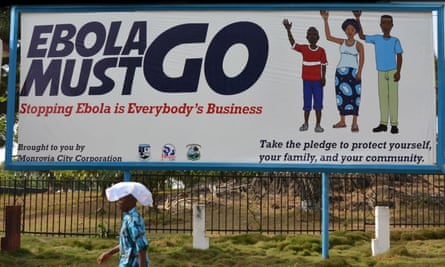The World Health Organisation (WHO) is expected to declare the Ebola crisis officially over on Thursday, as experts suggest an investment of 40p a year for every person on the planet would make the world far better equipped to deal with similar outbreaks of infectious disease.
If, as is likely, Liberia receives the all-clear after going 42 days without any new cases of Ebola, the WHO will announce the end of a two-year epidemic that has killed more than 11,000 people, ravaged communities in three west African countries, and revealed profound failings in the international community’s response.
On Wednesday, a report from a group of international health experts convened in the wake of the crisis warned that infectious diseases represent a threat matched only by wars and natural disasters when it comes to endangering life and disrupting societies.
But despite the scale of the menace, the Commission on Creating a Global Health Risk Framework for the Future found that efforts to prepare for pandemics have been chronically underfunded. It says that a global investment of £3bn each year – or 40p a person – would go a long way to reducing the threat posed by infectious diseases.
The report recommends strengthening health systems in low-income countries as a first line of defence, establishing a permanent WHO health emergency centre to lead and coordinate defences and action, and stepping up research and development into infectious diseases through an annual investment of at least £686m.
The commission and report – which were conducted by the American National Academy of Medicine in partnership with the Wellcome Trust and seven other philanthropic and government organisations including the Bill and Melinda Gates Foundation and the Rockefeller Foundation – calls for urgent action in 2016 to increase government, private and philanthropic spending on pandemic preparedness.
Dr Jeremy Farrar, the director of the Wellcome Trust and a member of the commission’s international oversight group, said it was high time the world learned the lessons of past infectious disease outbreaks.
“Few global events match epidemics and pandemics in potential to disrupt human security and inflict loss of life and economic and social damage,” he said.
“Yet for many decades, the world has invested far less in preventing, preparing for and responding to these threats than in comparable risks to international and financial security.”
Farrar said that although the WHO had taken steps to improve its emergency preparedness and response, further change – as set out in the report – was needed.
“The cornerstones of the proposed framework must be the creation of a strong, independent WHO centre to lead outbreak preparedness and response, and an expert body to galvanise the research and development of vaccines, therapies, diagnostics and other tools,” he said.
The WHO has faced fierce and sustained criticism over its handling of the crisis; not only did the delay in sounding the alarm slow the deployment of medical personnel, protective gear and medicines – and prompt calls for it to be stripped of its role in declaring disease outbreaks as international emergencies – it was also found to have toned down its own admissions of failure.
In April last year, the UN secretary general, Ban Ki-moon, appointed a high-level panel to study the lessons of the Ebola crisis and improve the world’s response to health crises.
The WHO said it had learned much from the outbreak and had already embarked on a “profound shift” towards becoming a fully operational emergency organisation.
“The new single programme will work across headquarters, regional and country offices and aims to ensure that WHO, governments and partner organisations can respond rapidly and effectively to outbreaks and health emergencies,” said a spokesman.

“WHO must enable countries to have key capacities in place, including leadership and coordination, logistics and human resources, so that they are prepared to deal with health emergencies. And when they need international assistance, we must ensure that WHO and partners can support national governments and work effectively with international partners.”
The Ebola outbreak, which began with the death of a young boy in Guinea in 2013, and was declared a “public health emergency of international concern” by the WHO the following August, was the worst in history.
It killed 11,315 people around the world and saw 28,637 infected. The overwhelming majority of the disease’s victims were from Liberia (4,809 deaths), Sierra Leone (3,955) and Guinea (2,536).
Speaking as the country began the final countdown to the all-clear, Liberia’s chief medical officer, Francis Karteh, said he was confident that lessons had been learned from the crisis.
“We know how to stop the spread,” he told AFP. “Liberia is no longer at risk like the way it was.”

Comments (…)
Sign in or create your Guardian account to join the discussion